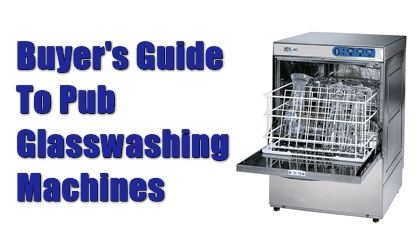Providing your customers with clean glasses to drink from and clean crockery and cutlery to eat with is essential in any pub and to do this you need glass and dishwashers. Nothing will ruin your reputation quicker than dirty glasses or crockery!
Effective cleaning is a combination of heat, chemical and mechanical actions – glass/dishwashers will take care of the first two, only manual intervention will take care of the last.
Deciding on the right commercial glass/dishwasher for your pub or commercial kitchen depends on a few important factors, and it’s vital to get the right machine for the job.
The most common washer types are:
Undercounter – these glass/dish machines are similar to residential models and can handle up to 35 racks per hour. They usually use a built-in heating element to flash heat glasses/dishes and ware to 180 degrees Fahrenheit for sanitisation.
In Sink Glasswashers – these washers are for the quick washing and rinsing of glassware. As the name suggests they fit into a bar sink and have a rotating brush set in hot water to scrub dirty glasses. (They require high maintenance to keep them scrupulously clean and are not the preferred method of glass washing of many Environmental Health Officers nor my personal preference – upon taking one managed pub I was horrified to discover some kind of white flat worm living quite happily in the bottom of a brush machine and have never used one since!)
Conveyor – these washers are for high volume applications like cafeterias or institutions and can process over 400 racks per hour. It is highly unlikely that you will need a machine that can handle 400 or even 150 racks per hour. Depending on size a modern, well maintained glass/dishwasher will process 300-400 glasses an hour and 150 to 300 pieces of crockery per hour – this should be more than adequate for the average pub.
The most common accessories are:
Booster Heaters – these stand-alone units pre-heat water to the required 180 degrees Fahrenheit for proper sanitisation. They operate independently of the dishwashing machine and insure that enough hot water is available for washing. Booster heaters are typically used on large Conveyor or Flight dishwashers that process large volumes of dishes per hour. Most undercounter and door type units have a built-in booster heater. Check before you buy any glass/dishwasher to see if you’ll need a booster heater or not.
Many glass/dishwashers are specifically designed to be connected to your hot water system so the need for a booster heater is not required. Check before you buy any glass/dishwasher to see whether it is cold or hot water fed.
Drainage pumps – these are often incorporated into the design and manufacture of glass/dishwashers but in some instances are not included in the price/specification. They are used to rapidly drain the machine between washes of the excess water in the washing cabinet used in the washing process. Check before you buy any glass/dishwasher for the need for a drainage pump (either built in or external).
Detergent / Rinse Aid Dispensing
Most machines automatically dispense the correct dose for each wash cycle as part of the washing/rinsing process, however, not all will and not all machines have built in reservoirs for these chemicals (rather relying on external tubes that sit in chemical bottles at the side of the machine). My preference for any machine is that they automatically dose these chemicals and that they have built in reservoirs for the chemicals. This will reduce the chance of over/under dosing of chemicals if manually added. Again check before you buy.
Stands, baskets/racks and basket/racks stands
Many machines are supplied with a stand and racking for spare baskets/racks, however, many of these items are separately charged. Most machines will only be supplied with one or two baskets/racks additional baskets/racks will be charged separately. Check before you buy.
